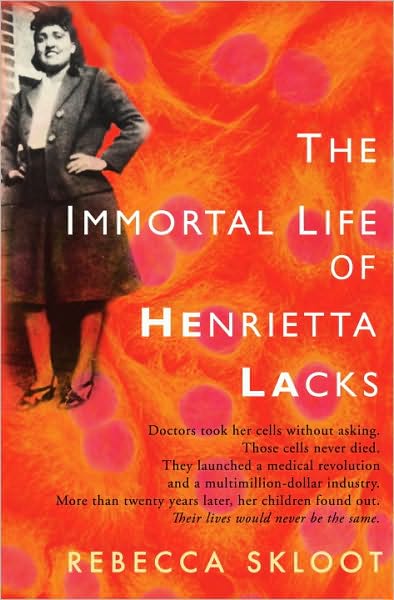
I'm so glad I read it! Skloot explains the science in a way that's understandable to anyone and, most importantly, she tells the story of Henrietta Lacks and her family in a gripping way. After all, it's not like this story should surprise anyone. It may, but it shouldn't. It did, however, make me angry.
It all started in the early 1950s when Henrietta Lacks felt a lump in her cervix. The doctors didn't really pay attention at first. Indeed, she even had a healthy delivery of her last child after she'd felt something was off. Later on they found the cancer that would kill her sooner rather than later. Of course, the doctors at Johns Hopkins--which did have a ward for African-Americans at the time--took samples of her tumor and of healthy tissue. At the time, George Gey had been trying to cultivate cell cultures with little success in keeping them alive. With Henrietta's cells, however, he found what he'd been looking for.
Henrietta's cells, also known as HeLa, have been instrumental in plenty of medical breakthroughs in the last 60 years, including the development of vaccines and cancer treatments. Here's the thing: for-profit organizations have made millions upon millions selling HeLa cells. Nobody had bothered to tell the Lacks family, much less Henrietta when she still lived, that they had taken the cells and kept them alive. The Lackses did find out and much of the story Skloot tells is about their ordeal trying to learn and come to terms with what Henrietta's cells have meant to the world.
Skloot did a fantastic job of telling the story from all sides, though it's quite clear she became close to the Lacks family, in particular with Deborah Lacks, Henrietta's daughter. She's quite up front about it, so you know there is some bias in the book. Still, I think most of us would also have been bothered by the arrogance some doctors show in light of what happened. After a court decision that basically established that your cells are no longer your concern after they leave your body, a Stanford researcher smugly said that patients can try to negotiate what happens to their tissue when they come in with a ruptured appendix. It still pisses me off to think that someone can be such a damn bastard.
My reaction probably stems from the fact that I intensely dislike doctors. I only go if I have to. That's my own issue. That said, I doubt people would object to having their cells used in research that has helped save lives. But doctors have a very unfortunate tendency to forget these cells come from people. And really, Deborah Lacks wanted everyone to remember that her mother was a person--someone that had children and loved and felt pain and happiness. A little respect and recognition would have been nice.
Great book and very much worth reading.
Next up: The Weird Sisters, by Eleanor Brown.
No comments:
Post a Comment
Note: Only a member of this blog may post a comment.